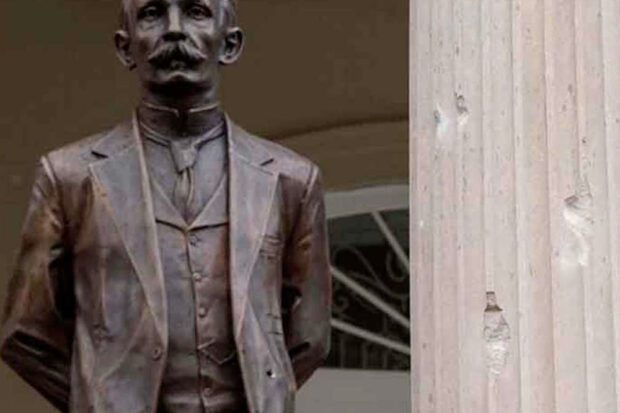
On April 30, 2020, Alexander Alazo, a Texas resident and Trump supporter—he wrote Trump 2020 on a Cuban flag—took an AK-47 and fired 32 shots at the Cuban Embassy in Washington, D.C. He didn’t hit anybody, although that was his intention—he was shouting to try to entice someone out to shoot at. Shots did penetrate to the interior of the building, which was occupied. The D.C. police responded promptly and arrested the shooter.
Now, a U.S. government psychiatrist, together with the lawyers for the defense, declared that Alazo was not “legally responsible” at the time that he carried out the attack, so he was found not guilty. He was freed, although a prior judgment of the court determined that his actions showed him to be a danger to society.
The authorities decided to ignore the evidence of Alazo’s links and contacts with groups and individuals in Florida who have track records and “priors” of promoting violence and terrorism against Cuba. He was never charged as a terrorist, despite the fact that actions such as he carried out are explicitly described as terrorist in U.S. anti-terrorism legislation.
In a subsequent attack on the Cuban Embassy, the U.S. authorities apparently decided to circumvent the impunity process by never finding the attacker at all.
There was another attack on the Cuban Embassy on Sept. 24, 2023, when a man threw two Molotov cocktails into the embassy, which was occupied. The attack was caught on the surveillance cameras of the embassy. The Cuban authorities promptly provided this footage to the police and Secret Service, which is supposed to protect the embassy.
Because it is located in an area of Washington, D.C., that has other embassies and government buildings nearby, there is certainly other camera footage, especially as it has been determined that the same individual walked past earlier in the day, apparently sizing up the scene for his crime.
Somehow, a thorough U.S. Secret Service investigation hasn’t turned up any evidence. Over a year later and after multiple meetings between the Cubans and the responsible U.S. agencies, no evidence has been forthcoming from the United States, and the only result is “Investigation proceeding, no information.”
The Cubans have lost patience with this non-investigation and held a news conference on Oct. 17, accusing the United States of allowing, and even encouraging, these attacks by their inaction. Johana Tablada, Cuba’s deputy director of U.S. affairs, has spent almost five years at the Cuban Embassy in Washington, D.C. She said, “The message is, against Cuba, you can do whatever you want.”
She also said that both U.S. law and international law place the obligation of protecting embassies on the host country and that the U.S. inaction is a violation of those laws.
Shortly after the 2023 attack, U.S. National Security Adviser Jake Sullivan had stated that “the United States strongly condemns Sunday’s reported attack on the Cuban Embassy in Washington, D.C. Attacks against diplomatic facilities are unacceptable. We are in contact with Cuban Embassy officials and law enforcement authorities to ensure an appropriate and timely investigation as well as to offer our support for future protective efforts.”
The “appropriate and timely investigation” has not happened. Neither have the “future protective efforts.” Cuban authorities state that they have requested more lighting for the front of the embassy, more frequent patrols and restrictions on cars parking in front of the embassy, but that none of these requests have been granted.
Cuban Foreign Minister Bruno Rodríguez Parrilla stated that “the Cuban Embassy in the U.S. was the target of a terrorist attack by an individual who launched two Molotov cocktails. The anti-Cuban groups resort to terrorism when feeling they enjoy impunity, something that Cuba has repeatedly warned the U.S. authorities about.”
It is the essence of hypocrisy for the United States, which facilitates terrorist attacks on Cuba, to maintain Cuba on the list of State Sponsors of Terrorism. It’s absurd but not funny, since Cuba being on this list makes financial institutions and other countries afraid to do business with Cuba for fear of U.S. reprisals.
As only one example of many, in January 2024, the Axis Bank of India refused to process a remittance from the Indian company Panacea to Cuba as payment for raw materials purchased by the Cuban biotech company CIGB for the production of the pentavalent vaccine. The bank cited Cuba’s inclusion on the U.S. government’s list of State Sponsors of Terrorism.
On Oct. 29 and 30, the United Nations will again discuss and vote on the U.S. blockade of Cuba. The evidence will be clear and convincing, and the vote will be similar to that of last year when every country in the world voted against the blockade except the United States and Israel, which voted in favor, and Ukraine, which abstained. Unfortunately, these are non-binding resolutions.
It would seem, however, that “a decent respect to the opinions of humankind” should compel the U.S. government to change a policy that is supported by not even one of its closest allies except the openly genocidal client state of Israel.

